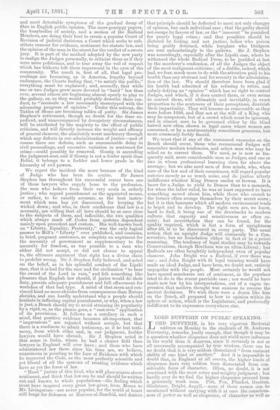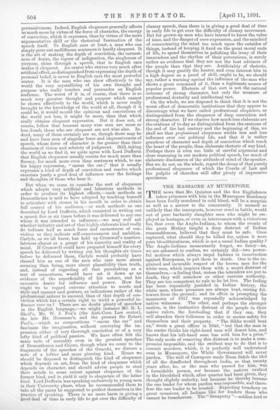LORD DUFFERIN ON PUBLIC SPEAKING. persuasiveness. Indeed, English eloquence generally
affects us much more by virtue of the force of character, the energy of conviction, which it expresses, than by virtue of the mere argumentative skill or the rhetorical fascination of the speech itself. To English ears at least, a man who can simply pour out mellifluous sentences is hardly eloquent. It is the art of making the depth of conviction, the earnest- ness of desire, the vigour of indignation, the singleness of purpose, shine through a speech, that to English ears makes it eloquent. An orator who strives very much after artificial effect, as distinguished from expressing the depth of personal belief, is never to English ears the most powerful orator. It is the man who can show effectively to the world the very crystallising of his own thought and purpose who really touches and persuades an English audience. The worst of it is, of course, that there is so much very genuine thought and purpose which cannot be shown effectively to the world, which is never really brought to the knowledge of the world at all, though if it could be, it would mould the opinions and convictions of the world not less, it might be more, than that which really obtains eloquent expression. But it does not, of course, follow that because many wise men are more or less dumb, those who are eloquent are not wise also. In- deed, many of them certainly are so, though there may be and have been men of singular force and impressiveness of speech, whose force of character is far greater than their clearness of vision and sobriety of judgment. Still, taking the world as we find it, we quite agree with Lord Dufferin that English eloquence usually counts for much more than fluency, for much more even than sentences which, to use his happy expression, "caress the ear ;" that it usually expresses a kind of depth of conviction and resolve which exercises justly a good deal of influence over the feelings and thoughts of those who hear it.
But when we come to consider the sort of eloquence which adopts very artificial and laborious methods in order to produce its highest effects,—such methods as Demosthenes is said to have adopted by teaching himself to articulate with stones in his mouth in order to obtain full control of his audience,—or such methods as one described by Lord Dufferin, which consisted in writing out a speech five or six times before it was delivered to any one whom it was intended to influence,—we may well ask whether industry and art of that highly elaborate kind really do indicate half as much force and earnestness of con- viction as they indicate self-consciousness and ambition. Carlyle, as we all know, has held up Cromwell's inarticu- lateness almost as a gauge of his sincerity and reality of mind. If Cromwell could have prepared himself for every speech he delivered by writing opt, his thoughts six times before he delivered them, Carlyle would probably have classed him as one of the men who care more about seeming than being, more about plausibility than truth, and, instead of regarding all that painstaking as a test of earnestness, would have set it down as an evidence of the superficiality of his nature, and his excessive desire for influence and power. How far ought we to regard extreme attention to words and style and manner and gesture, as indications rather of the professional ardour to succeed, than of that depth of con- viction which has a certain right to wield a powerful in- fluence over us ? There are no doubt plenty of speeches in the English language,—we might instance Mr. R. L. Sheil's, Mr. W. J. Fox's (the Anti-Corn Law orator), the late Mr. Horsman's, and the present Sir Robert Peel's,—which as compositions "caress the ear" and fascinate the imagination, without conveying the im- pression either of very thorough conviction or of a very lofty kind of political passion. We have often felt the same note of unreality even in the greatest speeches of Demosthenes and Cicero, though when we come to the fragments of the speeches of the Gracchi, we discern a note of a loftier and more piercing kind. Hence we should be disposed to distinguish the kind of eloquence which depends on art, from the kind of eloquence which depends on character, and should advise people to steel their minds to some extent against eloquence of the former kind, and to yield it only to eloquence of the latter kind. Lord Dufferin was speaking exclusively to young men in their University phase, when he recommended them to take all the pains he suggested to perfect themselves in the practice of speaking. There is no more harm in giving a good deal of time in early life to get over the difficulty of clumsy speech, than there is in giving a good deal of time in early life to get over the difficulty of clumsy movement. But for grown-up men who have learned to know the value of time, and the danger of over-expression, and the mischief of concentrating the mind too much upon the outsides of things, instead of keeping it fixed on the great moral ends of life, to spend themselves in polishing the irony of their innuendoes and the rhythm of their perorations, is surely rather an evidence that they are not the best advisers of the people than that they are. Artificiality of rhetoric, though it may gratify the hearer, and oven interest him in a high degree as a proof of skill, ought to be, we should say, rather a warning against the influence of the man who shows a great command of it, than a legitimate source of popular power. Rhetoric of that sort is not the natural outcome of strong character, but only the measure of professional dexterity and intellectual tact.
On the whole, we are disposed to think that it is not the worst effect of democratic institutions that they appear to discourage what we have called professional eloquence, as distinguished from the eloquence of deep conviction and strong character. If we observe how much less elaborate are the orations of to-day as distinguished from the orations of the end of the last century and the beginning of this, we shall see that professional eloquence wields less and less influence over our political life, and that it is rather grandeur of character and depth of conviction which reach the heart of the people, than elaborate rhetoric of any kind. Perhaps there is even too little of careful argument and close reasoning in our modern political speech, too much of elaborate disclosures of the attitude of mind of the speaker. But we do not, on the whole, regret the decay of that purely professional eloquence of which the Courts of Law and the pulpits of churches still offer plenty of impressive specimens.



































 Previous page
Previous page